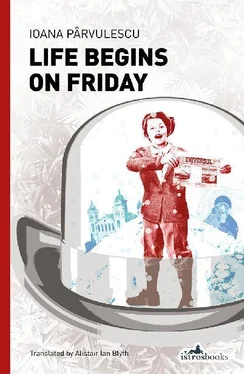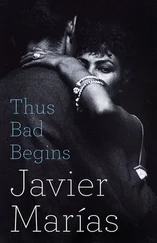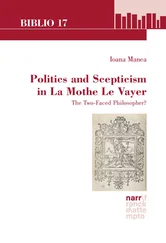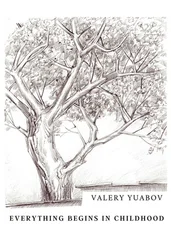‘I don’t understand where his drum is,’ interjected Nicu, and the doorman explained that that was the breed.
‘And this here is Parisian, I called him that because he has a lorgnette, as you can see… Look, here’s one called Nicu, I named him that after you.’
It was the one that had caught the lad’s eye from the very start: it had green scales at its throat, a marvel, and, for some reason, perhaps because it had rubbed against a thistle or some wire, the feathers on top of its head were raised, like a tuft.
‘Want him?’ asked the owner, but Nicu could not take Nicu, it was better he stay there, to remind the doorman of him. He chose a beautiful female, as white as snow, and speckled with black, as if she were wearing a polka dot dress.
‘What’s her name?’
She was called Speckle. The doorman took her and put her in a large cage, then he gave her some oats — Nicu was a little surprised that horses and doves ate the same thing — kernels of maize, lentils and rapeseed. The doorman explained to him how to feed Speckle and how to build her a large, airy house.
They went back inside old man Cercel’s house, which was small and rather dark, but whitewashed and kept clean by his wife. The woman could not stand the doves, because, she said, they had their living room, privy and promenade all in the same place.
‘In spring come and buy a pair, doves are sold in pairs,’ said the doorman.
‘Do you think I could keep doves when I grow up? I haven’t decided yet whether I’m going to be a champion skater or raise poultry. I don’t want to be an errand boy, because what do you do if you lose what you’re supposed to deliver?’
‘What else can you do, they’ll give you the sack,’ interjected the coachman merrily.
The doorman offered his guests syrup and plum jam and water — but the coachman declined the latter, saying he was not thirsty. Neither the stuffed cabbage nor the Christmas sweet bread was ready, unfortunately, and so Nicu has to content himself with the smell. In any event, it was still the fasting period, although the lad would have been ready to pretend he had forgotten. But even so, old man Cercel’s wife would not have given him anything; she liked children less than she did doves. In the coach, Nicu started scratching himself.
‘I think I’ve caught a flea,’ he said, but after that he became absorbed in looking after Speckle and worrying about the lost envelope, while the coachman was absorbed in his bottle: he had rediscovered his thirst.
Evening . I have at last met Mr Dan Crețu. Papa himself brought him. He went to collect him from the hôtel in our carriage and with the coachman in the employ of our neighbour, Mr Văleanu, Elisabeta’s father. Our Nelu is ill. Papa is taking care of him and I take him food, because everybody else is busy. Let me write here at least that I had been expecting the stranger’s visit with my heart in my mouth, and my annoyance at Alexandru’s silence took second place. As far as I could see looking outside, where it was quite dark, Mr Crețu seemed to have great difficulty alighting from the carriage and his gait was unsteady. He entered the hall and was about to enter the living room still wearing his galoshes, but Mama, who greeted him, told him with the admirable grace of a true mistress of the house: ‘If you wish to take off your galoshes, the boy will help you, so that you will not get dirty.’ And she showed him the place. Mr Crețu became highly embarrassed and looked at the pairs of footwear by the door: Papa’s galoshes, Mama’s chevreau boots, my boots with the heels, and Jacques’ overshoe. Such little things sadden me the most, so much so that sometimes I feel like lying in bed and never getting up again, I feel like telling life that I’m going on strike. For, whenever we buy Jacques overshoes, we have to throw one away.
Dan Crețu did not understand at first, he looked at me questioningly; then he looked at my feet. So I invited him inside and he took off his galoshes by himself, refusing any help. When he entered he saw Jacques on the couch, and our guest, pale already, turned white, then everything drained from his face and he looked as if he were empty inside. Papa invited him to sit in the place of honour, in the armchair by the fire, which was half turned towards the Christmas tree which, I may say, was decorated rather well (with yellow apples, red candles and an angel at the top, nothing more, since I hadn’t draped any tinsel). Since the light of the flames was dancing on his face and I was seated to one side, I was able to gaze at him freely, although it is impolite to gaze at a guest so intensely. Fortunately, Mama was not looking in my direction, or else she would have admonished me. And I think he is younger than they say. At first his face said nothing to me; it is hard to read his physiognomy. I was also hindered by the manner in which he was dressed, which was very slovenly, since I for one believe that the garment maketh the man, although my parents have taught me that this is not so and that I should not judge people by their clothes… I was also confused by his face: he did not have a beard properly speaking, but he was unshaven. His hair was glossy and cut short. Later, I calmed down and after that I was able to read the emotions on his face, whenever he was asked a question. At one point, Mama, who seemed to me to have taken to him from the very first, said to him with a gayness out of keeping to her: ‘Is it true that you forge banknotes? I ask merely because we ourselves could do with some…’
And then a miracle occurred. Dan Crețu smiled for the first time and I saw his handsome white teeth, but above all else, I saw a face more luminous and sweeter than I could ever remember seeing before. He all but grew a halo, like the moon does on some nights. It was as if there were two people in him: one utterly blank most of the time, a person that did not capture the attention and faded into the background, and the other of a beauty that was, how can I put it? It was a beauty that was like that of a romantic painting, but that appeared only when he smiled.
At eight o’clock Signor Giuseppe, our neighbour, arrived: he does not speak Romanian very well, but he played the guitar for us, he is a good and a jovial man, but the cook always scolds me for thinking that all people are good. (Except one!) Then we sat down at the table, for we were all hungry. Papa was jovial too and he told us a large number of medical stories, to which Mr Crețu listened very carefully and made knowledgeable comments, to the amazement of all. Papa started telling us about the world of the theatre, with which he is familiar as a physician, because otherwise I have to plead with him to come with us to see performances. And he told us a story that we had not heard, about Grigore Manolescu, our first true Hamlet: ‘He is from a boyar family, his father was Alexandru Manolescu, who had a house next to the Măgureanu Hermitage, and he did not study hard at the St Sava College, near our house, where he was a pupil, and he had to repeat the year. And when he was growing up, aged fourteen, he went to the Conservatory, without his father’s knowledge. He was not at all attractive, his arms were too long, like a monkey’s, and his hands were like paddles, lacking in expressivity, and above all he was bandy-legged. Worse still, he had a lisp.’
‘ Mio Dio! ’ exclaimed Signor Giuseppe, who is sensitive to all that pertains to the stage.
‘And so, out of pity, the teacher sat him at the back of the class. One day, he invited him to stand on the dais to recite a poem, and oh how the rest of the class laughed, even though the poem was sad. But the lad had mettle. He rehearsed with stones in his mouth, stubbornly, in front of the mirror at home, and he rectified his diction in every respect. Many miracles happen in the theatre, and also in medicine, if there be a will. And for the second time he mounted the dais and recited Lamartine’s The Lake , so beautifully that nobody laughed this time. One day, in class, they read a play that moved him more than any other ever had, and so Grigoraș asked the teacher what it was, and the teacher told him: Hamlet . Thereafter, the lad had the fixed idea that he had to play Hamlet. But his father read in the newspaper of the fact that his son was at the Conservatory and so, in order to stay the hand that was about to strike him — old man Manolescu had a heavy hand — the son said: ‘I went to the Conservatory to correct my diction and to become a lawyer.’ He kept the play Hamlet , a small book translated into French, with him at all times, it was his visiting card, although in rehearsals he was given only the rôles of comic Pantaloons. When he reached the age of sixteen, his father admonished him for being in danger of having to repeat the school year yet again. One day, during a lesson at the Conservatory, Matei Millo the great actor and director came into the classroom. He told the teacher that he wanted to take a pupil. The teacher showed him a star pupil, a handsome young man who sat at the front of the class, but Millo pointed at Grigore Manolescu, at the back. And so it was that Grigore, now aged sixteen, played the rôle of a Pantaloon on stage alongside Millo and Frosa Sarandy.’
Читать дальше












